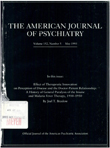Contrasts between patients with affective disorders and patients with schizophrenia on a neuropsychological test battery
Abstract
OBJECTIVE: This study was designed to ascertain the degree and specificity of cognitive impairments in patients with schizophrenia and patients with affective disorders. METHOD: Cognitive function was assessed with a neuropsychological test battery in consecutively admitted patients with schizophrenia (N = 57), unipolar depression (N = 29), and bipolar disorder (N = 16). RESULTS: The performance of the schizophrenic group was significantly below that of the groups with affective disorders on measures of attention and psychomotor speed, verbal and visual memory, and problem solving and abstraction. IQ was lower in the schizophrenic group and appeared to have deteriorated from a normal premorbid level that was not different from that of the affective disorder groups, as determined by the Wide Range Achievement Test--Revised reading test, a putative measure of premorbid intelligence. When IQ was controlled, differences between the groups in problem solving and visual memory remained. Psychiatric symptoms had a larger impact on test performance in the affective disorder groups than in the schizophrenic group. CONCLUSIONS: These results suggest that patients with schizophrenia perform systematically worse on cognitive measures than patients with affective disorders, which is consistent with their generally poorer outcome. The results also indicate that schizophrenia and affective disorders are qualitatively distinguishable in neuropsychological terms, given differences in apparent intellectual deterioration, profiles of cognitive impairment, and associations between cognitive performance and psychopathology.
Access content
To read the fulltext, please use one of the options below to sign in or purchase access.- Personal login
- Institutional Login
- Sign in via OpenAthens
- Register for access
-
Please login/register if you wish to pair your device and check access availability.
Not a subscriber?
PsychiatryOnline subscription options offer access to the DSM-5 library, books, journals, CME, and patient resources. This all-in-one virtual library provides psychiatrists and mental health professionals with key resources for diagnosis, treatment, research, and professional development.
Need more help? PsychiatryOnline Customer Service may be reached by emailing [email protected] or by calling 800-368-5777 (in the U.S.) or 703-907-7322 (outside the U.S.).



